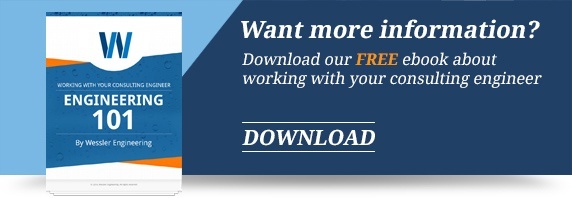 When we were picking a consultant to redesign our website, we had very little support for how to make the selection. I know how to design a wastewater treatment plant, but I was certainly no expert in website design. This is not something I do every day, or any day for that matter – similar to your picking an engineer – and I was concerned about making the most cost-effective decision while ensuring our website reflected who we are. After exploring our options, we narrowed the list to three companies – all who were capable of designing a website. We were leaning towards the company with the lower price but realized their proposal didn't meet our needs. We chose the company (SpinWeb) that provided a blueprint pre-design and offered on-going support. During the project, we discovered how well they listened to our needs and solicited our input every step of the project. We made the right decision, which has led to a long-term working relationship, but a list of questions would have simplified the selection process.
When we were picking a consultant to redesign our website, we had very little support for how to make the selection. I know how to design a wastewater treatment plant, but I was certainly no expert in website design. This is not something I do every day, or any day for that matter – similar to your picking an engineer – and I was concerned about making the most cost-effective decision while ensuring our website reflected who we are. After exploring our options, we narrowed the list to three companies – all who were capable of designing a website. We were leaning towards the company with the lower price but realized their proposal didn't meet our needs. We chose the company (SpinWeb) that provided a blueprint pre-design and offered on-going support. During the project, we discovered how well they listened to our needs and solicited our input every step of the project. We made the right decision, which has led to a long-term working relationship, but a list of questions would have simplified the selection process.
What do you ask when hiring a consulting engineer? We developed a list of questions to assist you, soliciting input from our clients, engineers and client relation managers. These questions could help in your decision process, or may provide a few topics to discuss with your current engineer. While I am pleased with our related responses, there are areas we can improve. I hope this list provides useful information to strengthen your engineering relationship.
1. What are your response times to my emails and phone calls?
A key factor in a successful relationship is the agreement by both parties on acceptable response times. The engineer should ask you how quickly you are expecting a response when you send an email or leave a phone message. It is all about learning your expectations. Response times may vary from project to project - and from one phase to another - so be sure to clarify your expectations with the engineer. If you require a quicker response, you should reach an agreement with the engineer prior to hiring them. During the design phase, the response time will be slower because the engineer needs time to understand your question and analyze alternatives. Sometimes there are different options to be explored. However, during construction, time is money. If you have a question and the street is torn up, you need an immediate response. You will also see benefits from choosing a firm who is available to meet you face-to-face when issues arise or you need assistance.
2. How often should I expect communication from you?
As the client, you have every right to expect the engineer to communicate frequently during all project phases. You don’t want your engineers designing in a vacuum. Your consultant should provide regular feedback on your project’s progress in regards to budget, milestones met, timeline, and project updates. The frequency of communication will vary by project; some will involve weekly communication while monthly communication may be sufficient for other projects. This should be agreed to at the beginning of your project, so you will know what to expect.
3. Why should I hire you if your cost is higher?
Typically engineering fees are 15% - 17% of the total project cost. Therefore, you have more opportunity to save money on the construction cost of the project. Sometimes selecting an engineer because they are a few thousand dollars cheaper than another can cost you a lot more in construction. You will want to hire the firm that is most qualified for the project and then negotiate the fee. Be sure the consultant you pick produces a quality product. A good set of plans and specifications should result in lower construction costs, so ask to see an example of their plans and specifications. Quality designs and drawings result in competitive bids and ultimately provide a project that costs less overall to build. If information is lacking on the plans, the contractor will be forced to include additional costs due to guessing, resulting in higher bids. We suggest you talk to contractors who have worked with the engineering firm.
4. Do you incorporate a system of quality control checks as part of the deliverable?
A documented quality assurance/quality control process is important for you to ensure minimal change orders or mistakes. Does the firm involve a principal engineer throughout the project? Who will conduct a final review of the project before delivery? A good quality assurance/quality control process will help identify potential problems and minimize “surprises”.
5. How can you help me minimize construction cost for my project?
Choose an engineer that produces well-prepared design drawings and specifications. Why is this so important for your project? Well-organized drawings and specifications can provide a clear picture to the contractor of how you want to build your project, resulting in lower bids from contractors and minimizing the possibility of contractor-initiated change orders. Well laid out plans enable the contractor to accurately calculate quantities and costs for the project. This will ensure that you, the owner, get the most bang for your buck and do not overspend.
6. Are you open to my recommendations during the development process?
As the client, you should expect the engineer to hold face-to-face project-design meetings regardless of the project size. Don’t take what the consultants give you at face value. Since you know your system better than anyone, it is important for your critical eye to provide input during the development process. Identifying incorrect information and addressing the issues early results in a better design and a smoother construction process.
7. How important is it to meet to discuss a proposal prior to signing?
Prior to signing a proposal, we recommend you and your key team members (city engineer, mayor, town council members, etc.) meet with the engineer to discuss the proposal. This face-to-face meeting gives you an opportunity to review step-by-step the scope of services necessary for a successful project. We rely so much on technology for communicating that we sometimes forget the value of face-to-face conversations. In the long run, this proposal meeting will save your team time, money, and frustration.
8. What do you bring to the table that other engineers don’t?
As a client you need to ask the engineer what are the key differentiators. What sets them apart? Many engineering firms can provide the services you need, so it is important to look for characteristics that distinguish them from others. How well can they advocate for you, and are they a trusted advisor? They provide intellectual knowledge on how to put a project together, but will they treat this project like it is their own? If you get the sense you can’t trust a consultant, you probably shouldn’t be doing business with them.
I hope these questions will help when you are faced with the task of picking a civil engineering firm. I encourage you to give them a try on your next project.
Tags


